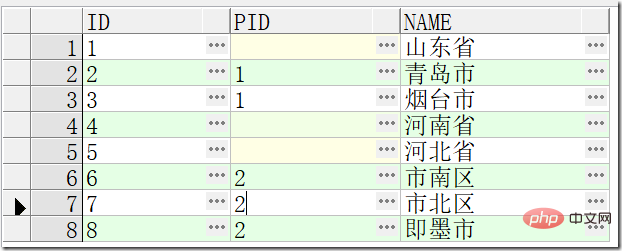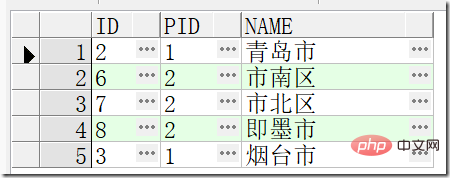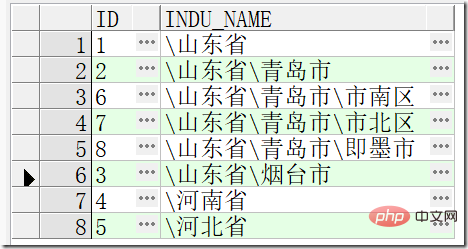One article analyzing ORACLE tree structure query
This article brings you relevant knowledge about Oracle. It mainly introduces the article about parsing ORACLE tree structure query. The article expands on the topic in detail. Let’s take a look at it together. I hope Helpful to everyone.

Recommended tutorial: "Oracle Video Tutorial"
In our daily programming, we often encounter tree structures Represents, for example, organizational structures, administrative divisions, etc. These are often displayed through a table in the database. Here we take a simple administrative division table as an example. In actual use, other description fields and levels can be added to it.

#The table is associated with ID and PID to achieve tree structure storage. The table creation and data statements are as follows:
-- Create table create table TREETEST ( id NVARCHAR2(50), pid NVARCHAR2(50), name NVARCHAR2(50) )
insert into TREETEST (ID, PID, NAME) values ('1', null, '山东省'); insert into TREETEST (ID, PID, NAME) values ('2', '1', '青岛市'); insert into TREETEST (ID, PID, NAME) values ('3', '1', '烟台市'); insert into TREETEST (ID, PID, NAME) values ('4', null, '河南省'); insert into TREETEST (ID, PID, NAME) values ('5', null, '河北省'); insert into TREETEST (ID, PID, NAME) values ('6', '2', '市南区'); insert into TREETEST (ID, PID, NAME) values ('7', '2', '市北区'); insert into TREETEST (ID, PID, NAME) values ('8', '2', '即墨市');
How to query the tree structure? Oracle provides recursive query for query. The basic syntax is as follows:
SELECT [Column]….. FEOM [Table] WHERE Conditional1 START WITH Conditional2 CONNECT BY PRIOR Conditional3 ORDER BY [Column]
Description:
- Condition 1---Filter conditions, for all Returned records are filtered.
- Condition 2---The limiting condition of the root node. Of course, you can also relax the permissions to obtain multiple root nodes, that is, obtain multiple trees
- Condition 3---The link condition, the purpose is Give what is the relationship between father and son, and perform a recursive query based on this relationship (in the above table, ID=PID)
- Sort---Sort all returned records
Let’s look at specific examples below:
1. Query all sub-nodes under Shandong Province
SELECT * FROM TREETEST t START WITH t.PID=1 CONNECT BY PRIOR t.ID = t.PID
where the ID is 1 is the node of Shandong Province, and the query results are as follows:

#2. Query the next-level child node of Qingdao City (note the difference from the above, all Child nodes and next-level child nodes)

3. If you need to connect Qingdao City, Shandong Province, etc. to display, you can use SYS_CONNECT_BY_PATH to achieve this
SELECT t.ID, SYS_CONNECT_BY_PATH(t.NAME, '\') AS INDU_NAME FROM TREETEST t START WITH t.PID IS NULL CONNECT BY PRIOR t.ID = t.PID
The query results are as follows:

4. In the same way, you can also proceed from bottom to top. Query
SELECT * FROM TREETEST t START WITH t.ID=8 CONNECT BY t.ID = PRIOR t.PID

Recommended tutorial: "Oracle Video Tutorial"
The above is the detailed content of One article analyzing ORACLE tree structure query. For more information, please follow other related articles on the PHP Chinese website!

Hot AI Tools

Undresser.AI Undress
AI-powered app for creating realistic nude photos

AI Clothes Remover
Online AI tool for removing clothes from photos.

Undress AI Tool
Undress images for free

Clothoff.io
AI clothes remover

Video Face Swap
Swap faces in any video effortlessly with our completely free AI face swap tool!

Hot Article

Hot Tools

Notepad++7.3.1
Easy-to-use and free code editor

SublimeText3 Chinese version
Chinese version, very easy to use

Zend Studio 13.0.1
Powerful PHP integrated development environment

Dreamweaver CS6
Visual web development tools

SublimeText3 Mac version
God-level code editing software (SublimeText3)

Hot Topics
 What to do if the oracle can't be opened
Apr 11, 2025 pm 10:06 PM
What to do if the oracle can't be opened
Apr 11, 2025 pm 10:06 PM
Solutions to Oracle cannot be opened include: 1. Start the database service; 2. Start the listener; 3. Check port conflicts; 4. Set environment variables correctly; 5. Make sure the firewall or antivirus software does not block the connection; 6. Check whether the server is closed; 7. Use RMAN to recover corrupt files; 8. Check whether the TNS service name is correct; 9. Check network connection; 10. Reinstall Oracle software.
 How to solve the problem of closing oracle cursor
Apr 11, 2025 pm 10:18 PM
How to solve the problem of closing oracle cursor
Apr 11, 2025 pm 10:18 PM
The method to solve the Oracle cursor closure problem includes: explicitly closing the cursor using the CLOSE statement. Declare the cursor in the FOR UPDATE clause so that it automatically closes after the scope is ended. Declare the cursor in the USING clause so that it automatically closes when the associated PL/SQL variable is closed. Use exception handling to ensure that the cursor is closed in any exception situation. Use the connection pool to automatically close the cursor. Disable automatic submission and delay cursor closing.
 How to create cursors in oracle loop
Apr 12, 2025 am 06:18 AM
How to create cursors in oracle loop
Apr 12, 2025 am 06:18 AM
In Oracle, the FOR LOOP loop can create cursors dynamically. The steps are: 1. Define the cursor type; 2. Create the loop; 3. Create the cursor dynamically; 4. Execute the cursor; 5. Close the cursor. Example: A cursor can be created cycle-by-circuit to display the names and salaries of the top 10 employees.
 How to stop oracle database
Apr 12, 2025 am 06:12 AM
How to stop oracle database
Apr 12, 2025 am 06:12 AM
To stop an Oracle database, perform the following steps: 1. Connect to the database; 2. Shutdown immediately; 3. Shutdown abort completely.
 How to paginate oracle database
Apr 11, 2025 pm 08:42 PM
How to paginate oracle database
Apr 11, 2025 pm 08:42 PM
Oracle database paging uses ROWNUM pseudo-columns or FETCH statements to implement: ROWNUM pseudo-columns are used to filter results by row numbers and are suitable for complex queries. The FETCH statement is used to get the specified number of first rows and is suitable for simple queries.
 What steps are required to configure CentOS in HDFS
Apr 14, 2025 pm 06:42 PM
What steps are required to configure CentOS in HDFS
Apr 14, 2025 pm 06:42 PM
Building a Hadoop Distributed File System (HDFS) on a CentOS system requires multiple steps. This article provides a brief configuration guide. 1. Prepare to install JDK in the early stage: Install JavaDevelopmentKit (JDK) on all nodes, and the version must be compatible with Hadoop. The installation package can be downloaded from the Oracle official website. Environment variable configuration: Edit /etc/profile file, set Java and Hadoop environment variables, so that the system can find the installation path of JDK and Hadoop. 2. Security configuration: SSH password-free login to generate SSH key: Use the ssh-keygen command on each node
 How to create oracle dynamic sql
Apr 12, 2025 am 06:06 AM
How to create oracle dynamic sql
Apr 12, 2025 am 06:06 AM
SQL statements can be created and executed based on runtime input by using Oracle's dynamic SQL. The steps include: preparing an empty string variable to store dynamically generated SQL statements. Use the EXECUTE IMMEDIATE or PREPARE statement to compile and execute dynamic SQL statements. Use bind variable to pass user input or other dynamic values to dynamic SQL. Use EXECUTE IMMEDIATE or EXECUTE to execute dynamic SQL statements.
 What to do if the oracle log is full
Apr 12, 2025 am 06:09 AM
What to do if the oracle log is full
Apr 12, 2025 am 06:09 AM
When Oracle log files are full, the following solutions can be adopted: 1) Clean old log files; 2) Increase the log file size; 3) Increase the log file group; 4) Set up automatic log management; 5) Reinitialize the database. Before implementing any solution, it is recommended to back up the database to prevent data loss.






